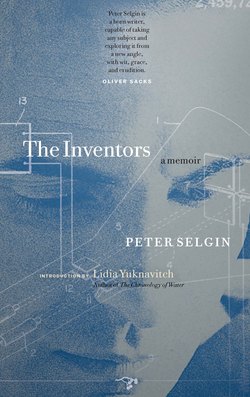Читать книгу The Inventors - Peter Selgin - Страница 14
На сайте Литреса книга снята с продажи.
ОглавлениеI.
Danbury, Connecticut, February, 2000
I BELIEVE IT WAS THE ANCIENT CHINESE WHO CURSED each other by saying, “May you live in interesting times.” I had an interesting father.
You’ll note that I’m not properly dressed for this occasion. In honor of my father, I’m wearing one of his moth-eaten cardigan sweaters, an affront to good taste, fashion, etiquette – all things my father thumbed his nose at.
As most of you here probably know, my papa was an iconoclast. He had too many other things on his mind to worry about protocols or conventions. Though he was once the director of a division of the National Bureau of Standards in Washington, D.C., his social standards were anything but exacting. Chesterton’s “If a thing is worth doing, it’s worth doing badly” was among his favorite sayings. An electronics engineer and inventor, he disdained all things irrational and considered all forms of tribal ritual and worship barbaric. He loathed – his word – all religions. Nor did Papa care much for parties, parades, sports, movies, concerts, the theater – anything that made him part of a group or audience and divided him from the fertile depths of his own polymath mind. He had no stomach for pomp, ritual, or any form of regimentation or conformity. He hated crowds and large gatherings. Weddings and funerals weren’t his cup of tea. This one, unfortunately, he had to attend.…
AFTER THE MEMORIAL service, as the respectful file out of the funeral parlor, you gather up the relics that you and your twin brother George assembled for the commemorative altarpiece: your father’s portable Royal typewriter, his oscilloscope, a Color Coder (one of his inventions), his favorite eggcup, the split-spined German dictionary that he kept next to his rocking chair in the living room.
As you do a stranger approaches you. She’s in her late seventies or early eighties, tall and thin, with a bent nose and short silver hair. She wears frameless octagonal eyeglasses and a reindeer-and-snowflake sweater in cheerful primary colors that offset her wintry complexion. As your brother chats with your half-sisters Ann and Clare (your father married three times) a dozen feet away, the woman walks straight up to you.
I was a friend of Paul’s – of your father’s, she says, taking your hands in hers. We knew each other for over forty years, she says. She has an accent – heavy, German. Her fingers are bony and ice-cold. She holds her winter coat draped over one arm and smells like the winter weather outdoors.
Nice to meet you, you say. (Forty. You do the math. Since you were in diapers.)
We knew each other very well, your father and I, she says.
You smile. You’re certain you’ve never seen her before.
Very well, she repeats. Then: Did you know your father was Jewish?
At first her declaration strikes you as no less peculiar than the woman herself, who, for all you know, has come from the neighborhood homeless shelter or from Fairfield Hills, the mental hospital in nearby Newtown. For all you know she drops into memorial services regularly to confront mourners with absurd pronouncements concerning their dearly departed. You’re about to dismiss her claim as ridiculous when a memory comes back to you, that time in Italy back in your early twenties, at a villa in the hilly outskirts of Piacenza, where you’d gone to visit some relatives on your mother’s side of the family, when one of a small army of second and third cousins no sooner set eyes on you than she declared, Ma lei e’ ebreo! (But you are Jewish!). Her judgment had something to do with the downward curve of your nostrils. But you didn’t take it all that seriously, in fact you forgot about it completely, until now.
All this time you’ve been staring at the old woman, who keeps holding your hands, shaking them.
Excuse me? you say to her.
He never told you?
Who are you?
My name is Bernice, says the woman. Bernice Mundt.
Bernice. Berenice. Beh-reh-nee-chay.… The name bubbles up from deep memory. It’s one you heard often growing up, during your parents’ frequent vicious fights.
I’m afraid you’re mistaken, you say. My father wasn’t Jewish. He was raised Catholic. My grandmother – his mother – went to mass regularly.
To this the old woman smiles, affirming not your reasoning but your naiveté. You turn to your brother, who’s still talking to Ann. Your mother is busy with other people on the far side of the chapel. The memorial service has been more celebratory than solemn. Your father’s death was anti-climactic, the cumulative effect of a series of strokes that removed him bit by bit from the land of the living, leaving a cheesy body in a nursing home to dress and feed, until his appetite died. Now his body burns to dust behind the funeral parlor’s draped walls. No one else sees the old woman talking with you. It’s as if she’s not really there, like she’s a figment of your imagination, her and her wintry odors and reindeer sweater.
Your father was Jewish, she says at last, firmly, smiling and shaking her head like a tolerant schoolmarm coping with an especially slow pupil. On both sides of his family, she says. They were prominent Jews.
Who told you this? you say. Where did you hear it? (You make no effort to conceal the accusatory tone of your voice.)
Paul – your father – he told me. Long ago. I thought you would want to know. I’m very sorry, by the way. He was a brilliant man, your father. A wonderful man.
The woman turns then and – as quietly as she came, with you watching after her – walks out of the funeral parlor.
